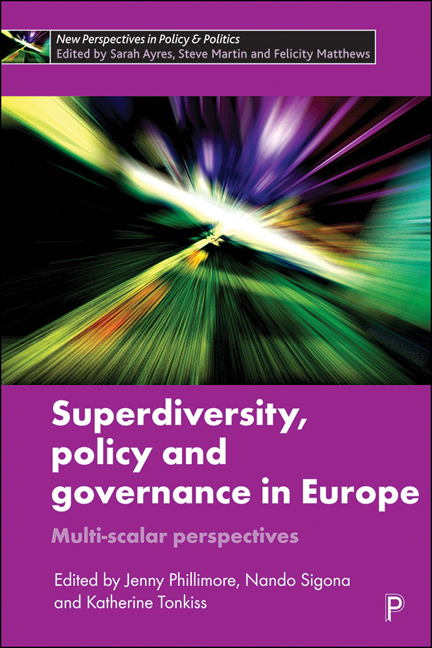Book contents
- Frontmatter
- Contents
- List of Figures and Tables
- Notes on Contributors
- Introduction: Superdiversity, Policy and Governance in Europe
- Chapter One Managing Superdiversity? Examining the Intercultural Policy Turn in Europe
- Chapter Two Mainstreaming in Response to Superdiversity? The Governance of Migration-Related Diversity in France, The UK and the Netherlands
- Chapter Three Making the Most of Superdiversity: Notes on the Potential of a New Approach
- Chapter Four Superdiversity and Sub-National Autonomous Regions: Perspectives from the South Tyrolean Case
- Chapter Five Transmigration: The Rise of Flexible Migration Strategies as Part of Superdiversity
- Chapter Six Superdiversity, Multiculturalism and Local Policies: A Study on European Cities
- Chapter Seven Integrating Superdiversity in Urban Governance: The Case of Inner-city Lisbon
- Chapter Eight Urban Planning and the Challenge of Superdiversity
- Chapter Nine Superdiversity in the Post-Industrial City: A Comparative Analysis of Backlash Narratives in Six European Neighbourhoods
- Index
Chapter Six - Superdiversity, Multiculturalism and Local Policies: A Study on European Cities
Published online by Cambridge University Press: 04 March 2021
- Frontmatter
- Contents
- List of Figures and Tables
- Notes on Contributors
- Introduction: Superdiversity, Policy and Governance in Europe
- Chapter One Managing Superdiversity? Examining the Intercultural Policy Turn in Europe
- Chapter Two Mainstreaming in Response to Superdiversity? The Governance of Migration-Related Diversity in France, The UK and the Netherlands
- Chapter Three Making the Most of Superdiversity: Notes on the Potential of a New Approach
- Chapter Four Superdiversity and Sub-National Autonomous Regions: Perspectives from the South Tyrolean Case
- Chapter Five Transmigration: The Rise of Flexible Migration Strategies as Part of Superdiversity
- Chapter Six Superdiversity, Multiculturalism and Local Policies: A Study on European Cities
- Chapter Seven Integrating Superdiversity in Urban Governance: The Case of Inner-city Lisbon
- Chapter Eight Urban Planning and the Challenge of Superdiversity
- Chapter Nine Superdiversity in the Post-Industrial City: A Comparative Analysis of Backlash Narratives in Six European Neighbourhoods
- Index
Summary
Introduction
This chapter, building on a comparative study of immigration policies at the urban level in Europe, discusses the present state of multiculturalist approaches and their adaptations at the local level after the ‘multiculturalism backlash’ (Vertovec and Wessendorf, 2009) in most political discourse. The relations between national frameworks and urban policies, the changing labels and the forms of continuity of local immigration policies, the involvement of civil society actors, the appearance of local policies of exclusion, will be the issues analysed in the chapter. As I will suggest in the conclusion, diversity could be the new framework within which multiculturalist stances can be reshaped.
Beyond multiculturalism?
In recent years, immigration policies in most European countries have been intended to reaffirm both the control of external borders and the values of identity and national belonging, and particularly so since 2001 (Balibar, 2012). Especially in the case of non-skilled third country nationals, this approach can be defined as neo-assimilationist. Learning the local language, displaying political loyalty, and adapting to national values of some kind are generally required (Antonsich, 2016). In an increasing number of cases, this includes language tests and the formal signing of special ‘integration agreements’ according to a demand for ‘civic integration’ (Joppke, 2007; Goodman, 2010).
This change in immigration policies goes hand in hand with growing disaffection with multiculturalism, at least as a discourse, in the European political debate (Prins and Slijper, 2002; Grillo, 2005). Several national leaders, including Blair, Cameron, Merkel and Sarkozy, have openly criticised the political idea of multiculturalism (Collett, 2011). This term can nevertheless be understood in different ways. It can be defined, following Modood, as ‘the recognition of group difference within the public sphere of laws, democratic discourses and the terms of a shared citizenship and national identity’ (2007, 2). But it can also be assumed, in practice, as an umbrella term covering many types of policies concerning ethnic and cultural diversities, migrants’ associations, promotion of ethnic minorities. In this framework, as Faist (2009) in particular has noted, diversity now appears more accepted in the political discourse than multiculturalism: it shifts the attention from the collective (ethnic group) to individuals; it creates links with other types of diversities; and it seems more acceptable from a neoliberal point of view, also because it may be seen as a resource for organisations, marketing and service delivery (‘diversity management’).
- Type
- Chapter
- Information
- Superdiversity, Policy and Governance in EuropeMulti-scalar Perspectives, pp. 122 - 145Publisher: Bristol University PressPrint publication year: 2020



